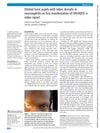 123 citations,
August 2005 in “Journal of the European Academy of Dermatology and Venereology”
123 citations,
August 2005 in “Journal of the European Academy of Dermatology and Venereology” The study found that Frontal Fibrosing Alopecia affects a broader age range of women and early treatment can help stop hair loss.
 23 citations,
January 2001 in “Chemical & Pharmaceutical Bulletin”
23 citations,
January 2001 in “Chemical & Pharmaceutical Bulletin” New pregnane derivatives are effective at inhibiting an enzyme linked to hair loss and reducing oil gland activity.
 15 citations,
December 2007 in “Dermatologic Therapy”
15 citations,
December 2007 in “Dermatologic Therapy” Hair transplantation has improved with techniques that increase graft survival and patient satisfaction for more natural results.
 13 citations,
May 2022 in “Cell discovery”
13 citations,
May 2022 in “Cell discovery” The study found new details about human hair growth and suggests that preventing a specific biological pathway could potentially treat hair graying.
 13 citations,
December 2019 in “Nutrients”
13 citations,
December 2019 in “Nutrients” An apple-based supplement was found to stimulate hair protein production, which may help with hair growth.
 8 citations,
March 2020 in “Frontiers in Cell and Developmental Biology”
8 citations,
March 2020 in “Frontiers in Cell and Developmental Biology” Researchers created immortal human skin cells with constant testosterone receptor activity to study hair loss and test treatments.
 January 2012 in “Human health handbooks”
January 2012 in “Human health handbooks” Traditional Indian remedies are used for hair health, but more scientific evidence is needed to prove their safety and effectiveness.
 159 citations,
October 2015 in “Science Advances”
159 citations,
October 2015 in “Science Advances” Blocking JAK-STAT signaling can lead to hair growth.
 96 citations,
October 2000 in “The FASEB Journal”
96 citations,
October 2000 in “The FASEB Journal” The p75 neurotrophin receptor is important for hair follicle regression by controlling cell death.
 14 citations,
March 2015 in “Clinical and Experimental Dermatology”
14 citations,
March 2015 in “Clinical and Experimental Dermatology” Human placental extract and minoxidil together significantly promote hair growth.
 77 citations,
July 2020 in “Cell”
77 citations,
July 2020 in “Cell” Muscles and nerves that cause goosebumps also help control hair growth.
 64 citations,
August 2014 in “The journal of allergy and clinical immunology/Journal of allergy and clinical immunology/The journal of allergy and clinical immunology”
64 citations,
August 2014 in “The journal of allergy and clinical immunology/Journal of allergy and clinical immunology/The journal of allergy and clinical immunology” A deficiency in the TTC7A gene causes immune problems, gut issues, and hair loss.
 41 citations,
October 2017 in “International Journal of Women's Dermatology”
41 citations,
October 2017 in “International Journal of Women's Dermatology” Most pregnant women experience skin darkening and hair changes, with these effects usually going away after giving birth.
 April 2024 in “Journal of translational medicine”
April 2024 in “Journal of translational medicine” MJ04, a new compound, effectively promotes hair growth and is a potential topical treatment for hair loss.
 18 citations,
December 2020 in “Frontiers in cell and developmental biology”
18 citations,
December 2020 in “Frontiers in cell and developmental biology” miR-140-5p in certain cell vesicles helps hair growth by boosting cell proliferation.
 3 citations,
March 2022 in “Haya: the Saudi journal of life sciences”
3 citations,
March 2022 in “Haya: the Saudi journal of life sciences” Dates may improve heart health, fight infections, protect kidneys, reduce inflammation, support pregnancy, promote dental and bone health, enhance mental function, and have anti-cancer properties, and are also beneficial for skin and hair care.
3 citations,
December 2021 in “Frontiers in Pharmacology” Ficus benghalensis leaf extracts can effectively promote hair growth and inhibit hair loss.
May 2019 in “Journal of Acupuncture Research” Sebalgukhwa-san (SGS) can help treat hair loss without liver toxicity.
 April 2024 in “Biomedicine & pharmacotherapy”
April 2024 in “Biomedicine & pharmacotherapy” Pilose antler extract helps hair grow in mice with a type of hair loss by speeding up the growth phase.
 6 citations,
June 2011 in “British Journal of Dermatology”
6 citations,
June 2011 in “British Journal of Dermatology” People with alopecia areata have higher levels of RBP4 protein and antibodies against it.
 1 citations,
March 2018 in “BMJ case reports”
1 citations,
March 2018 in “BMJ case reports” Dilated pupils can be an early sign of HIV/AIDS.
 96 citations,
January 1997 in “Clinics in Dermatology”
96 citations,
January 1997 in “Clinics in Dermatology” Pregnancy can cause skin pigmentation, stretch marks, and changes in hair, nails, and sweat glands, with most resolving after birth.
 15 citations,
February 2017 in “Nursing Clinics of North America”
15 citations,
February 2017 in “Nursing Clinics of North America” Targeted cancer therapies can cause skin side effects, which should be treated early to help patients' quality of life and treatment adherence.
27 citations,
March 2008 in “Cell stress & chaperones” Localized heat or specific injections can prevent chemotherapy-induced hair loss without affecting cancer treatment.
 8 citations,
January 2020 in “International Journal of Trichology”
8 citations,
January 2020 in “International Journal of Trichology” Different patterns on the scalp help diagnose types of hair loss without needing a biopsy.
 2 citations,
October 2022 in “The journal of investigative dermatology/Journal of investigative dermatology”
2 citations,
October 2022 in “The journal of investigative dermatology/Journal of investigative dermatology” AIRE deficiency causes hair loss similar to alopecia areata in mice.
 April 2024 in “Clinical, cosmetic and investigational dermatology”
April 2024 in “Clinical, cosmetic and investigational dermatology” Salvianolic Acid B helps hair grow by reducing cell stress and increasing blood flow to hair follicles.
 January 2023 in “Health science reports”
January 2023 in “Health science reports” French maritime pine bark extract significantly increased hair density in menopausal women.
November 2019 in “BMC veterinary research” The hair loss in Belgian Blue crossbred calves was caused by a diet issue, not by disease or infection.
 42 citations,
January 1998 in “BioDrugs”
42 citations,
January 1998 in “BioDrugs” Azathioprine's effectiveness and safety require careful monitoring and more research, especially regarding its use with corticosteroids and the role of TPMT status in patients.


























